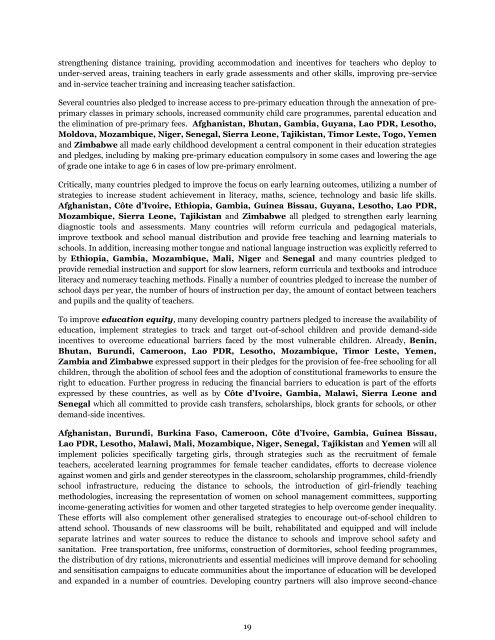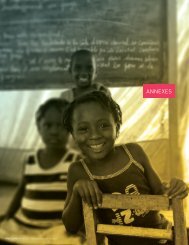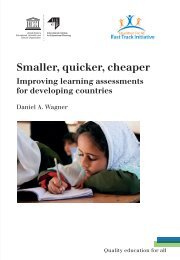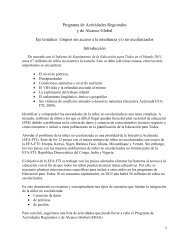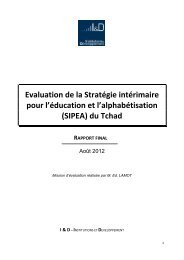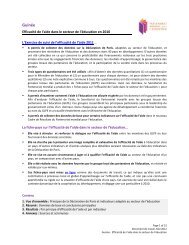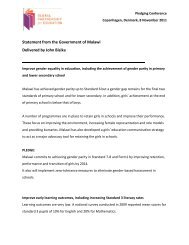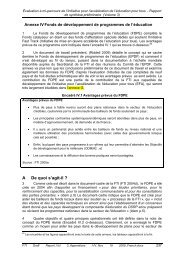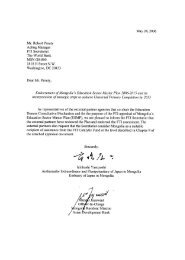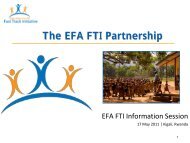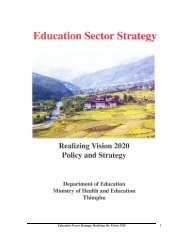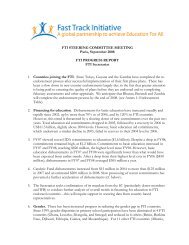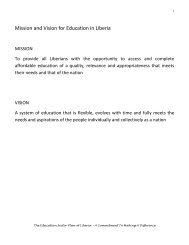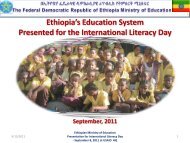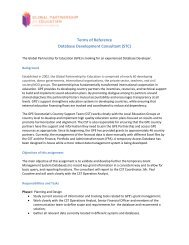Pledges to the Global Partnership for Education
Pledges to the Global Partnership for Education
Pledges to the Global Partnership for Education
Create successful ePaper yourself
Turn your PDF publications into a flip-book with our unique Google optimized e-Paper software.
streng<strong>the</strong>ning distance training, providing accommodation and incentives <strong>for</strong> teachers who deploy <strong>to</strong><br />
under-served areas, training teachers in early grade assessments and o<strong>the</strong>r skills, improving pre-service<br />
and in-service teacher training and increasing teacher satisfaction.<br />
Several countries also pledged <strong>to</strong> increase access <strong>to</strong> pre-primary education through <strong>the</strong> annexation of preprimary<br />
classes in primary schools, increased community child care programmes, parental education and<br />
<strong>the</strong> elimination of pre-primary fees. Afghanistan, Bhutan, Gambia, Guyana, Lao PDR, Lesotho,<br />
Moldova, Mozambique, Niger, Senegal, Sierra Leone, Tajikistan, Timor Leste, Togo, Yemen<br />
and Zimbabwe all made early childhood development a central component in <strong>the</strong>ir education strategies<br />
and pledges, including by making pre-primary education compulsory in some cases and lowering <strong>the</strong> age<br />
of grade one intake <strong>to</strong> age 6 in cases of low pre-primary enrolment.<br />
Critically, many countries pledged <strong>to</strong> improve <strong>the</strong> focus on early learning outcomes, utilizing a number of<br />
strategies <strong>to</strong> increase student achievement in literacy, maths, science, technology and basic life skills.<br />
Afghanistan, Côte d’Ivoire, Ethiopia, Gambia, Guinea Bissau, Guyana, Lesotho, Lao PDR,<br />
Mozambique, Sierra Leone, Tajikistan and Zimbabwe all pledged <strong>to</strong> streng<strong>the</strong>n early learning<br />
diagnostic <strong>to</strong>ols and assessments. Many countries will re<strong>for</strong>m curricula and pedagogical materials,<br />
improve textbook and school manual distribution and provide free teaching and learning materials <strong>to</strong><br />
schools. In addition, increasing mo<strong>the</strong>r <strong>to</strong>ngue and national language instruction was explicitly referred <strong>to</strong><br />
by Ethiopia, Gambia, Mozambique, Mali, Niger and Senegal and many countries pledged <strong>to</strong><br />
provide remedial instruction and support <strong>for</strong> slow learners, re<strong>for</strong>m curricula and textbooks and introduce<br />
literacy and numeracy teaching methods. Finally a number of countries pledged <strong>to</strong> increase <strong>the</strong> number of<br />
school days per year, <strong>the</strong> number of hours of instruction per day, <strong>the</strong> amount of contact between teachers<br />
and pupils and <strong>the</strong> quality of teachers.<br />
To improve education equity, many developing country partners pledged <strong>to</strong> increase <strong>the</strong> availability of<br />
education, implement strategies <strong>to</strong> track and target out-of-school children and provide demand-side<br />
incentives <strong>to</strong> overcome educational barriers faced by <strong>the</strong> most vulnerable children. Already, Benin,<br />
Bhutan, Burundi, Cameroon, Lao PDR, Lesotho, Mozambique, Timor Leste, Yemen,<br />
Zambia and Zimbabwe expressed support in <strong>the</strong>ir pledges <strong>for</strong> <strong>the</strong> provision of fee-free schooling <strong>for</strong> all<br />
children, through <strong>the</strong> abolition of school fees and <strong>the</strong> adoption of constitutional frameworks <strong>to</strong> ensure <strong>the</strong><br />
right <strong>to</strong> education. Fur<strong>the</strong>r progress in reducing <strong>the</strong> financial barriers <strong>to</strong> education is part of <strong>the</strong> ef<strong>for</strong>ts<br />
expressed by <strong>the</strong>se countries, as well as by Côte d’Ivoire, Gambia, Malawi, Sierra Leone and<br />
Senegal which all committed <strong>to</strong> provide cash transfers, scholarships, block grants <strong>for</strong> schools, or o<strong>the</strong>r<br />
demand-side incentives.<br />
Afghanistan, Burundi, Burkina Faso, Cameroon, Côte d’Ivoire, Gambia, Guinea Bissau,<br />
Lao PDR, Lesotho, Malawi, Mali, Mozambique, Niger, Senegal, Tajikistan and Yemen will all<br />
implement policies specifically targeting girls, through strategies such as <strong>the</strong> recruitment of female<br />
teachers, accelerated learning programmes <strong>for</strong> female teacher candidates, ef<strong>for</strong>ts <strong>to</strong> decrease violence<br />
against women and girls and gender stereotypes in <strong>the</strong> classroom, scholarship programmes, child-friendly<br />
school infrastructure, reducing <strong>the</strong> distance <strong>to</strong> schools, <strong>the</strong> introduction of girl-friendly teaching<br />
methodologies, increasing <strong>the</strong> representation of women on school management committees, supporting<br />
income-generating activities <strong>for</strong> women and o<strong>the</strong>r targeted strategies <strong>to</strong> help overcome gender inequality.<br />
These ef<strong>for</strong>ts will also complement o<strong>the</strong>r generalised strategies <strong>to</strong> encourage out-of-school children <strong>to</strong><br />
attend school. Thousands of new classrooms will be built, rehabilitated and equipped and will include<br />
separate latrines and water sources <strong>to</strong> reduce <strong>the</strong> distance <strong>to</strong> schools and improve school safety and<br />
sanitation. Free transportation, free uni<strong>for</strong>ms, construction of dormi<strong>to</strong>ries, school feeding programmes,<br />
<strong>the</strong> distribution of dry rations, micronutrients and essential medicines will improve demand <strong>for</strong> schooling<br />
and sensitisation campaigns <strong>to</strong> educate communities about <strong>the</strong> importance of education will be developed<br />
and expanded in a number of countries. Developing country partners will also improve second-chance<br />
19


